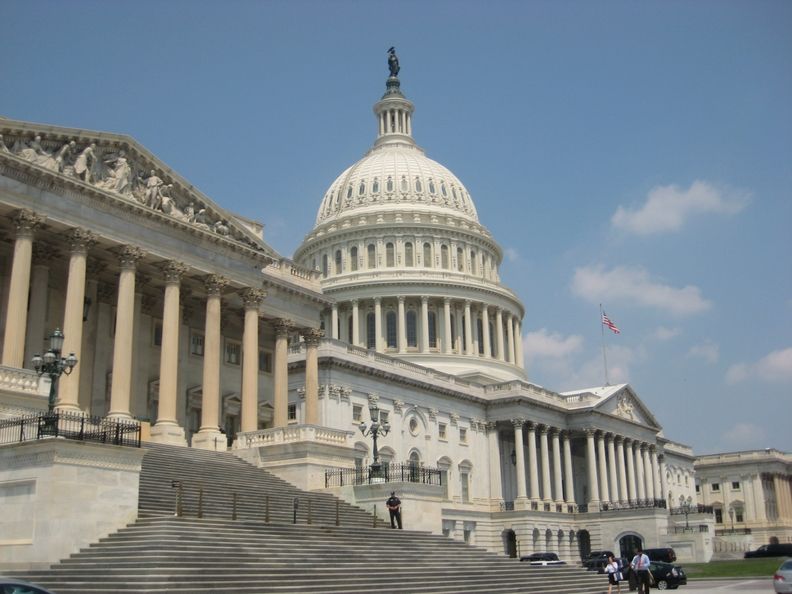An industry coalition of more than 20 groups sent a letter to congressional leaders Sept. 27 opposing efforts by some lawmakers to include the plastics tax in the $3.5 trillion spending and climate plan Democrats hope to pass soon.
On the other side, the main Senate backer of the tax, Rhode Island Democrat Sheldon Whitehouse, released a letter Sept. 28 from 20 environmental groups urging that it be included in that or other upcoming legislation, saying that “in our current political moment, we can’t afford to pass on the opportunity.”
“We’ve had a very significant investment that is well over seven figures, working to educate lawmakers in the House and the Senate … on the resin tax,” said Joshua Baca, the vice president of plastics at the American Chemistry Council.
Besides ACC, the industry letter was signed by the Plastics Industry Association, the Flexible Packaging Association, the Manufacturers Association for Plastics Processors and the National Association for PET Container Resources.
“We have been really robust in our advocacy on Capitol Hill, educating both on why the resin tax is bad, and more importantly, that we have a federal plan to deal with this,” Baca said. “And that message is resonating with a variety of pragmatic lawmakers.”
ACC released a plan in July calling for federal legislation requiring 30 percent recycled content in plastic products by 2030 and endorsing producer responsibility systems requiring companies to shoulder more of the financial cost of local recycling programs.
A day after the industry released its letter, Whitehouse released a letter from environmental groups supporting the tax, saying it would help “markets [that] are flooded with artificially cheap virgin resin.”
“We need action now to fix our reliance on virgin plastic, and that begins with a fee on virgin plastic resin used for single-use products,” the environmental groups said. “To kick-start a transition to a circular economy, where plastic is a truly recyclable resource, we need to fix the economic incentives that reward waste.”
The letter was signed by Ocean Conservancy, Greenpeace, Surfrider Foundation, Oceana and others.
They see the tax as addressing fossil fuel tax breaks that hurt recycling.
“Virgin plastics are cheap and prolific, in part because they have benefited from enormous subsidies to the fossil fuel industry,” said Nick Mallos, senior director with Ocean Conservancy’s Trash Free Seas Program.
The week also saw Whitehouse repeatedly take to social media, suggesting that industry was fine with a plastics recycling rate of less than 10 percent and saying that his original legislation, the Reduce Act, would put recycled plastic on a more equal footing with virgin plastic.
“Plastics waste is piling up in our oceans and rivers, but the plastics industry isn’t serious about recycling,” Whitehouse wrote on Twitter. “My Reduce Act solves this problem by making polluters pay to clean up their mess.”
But industry lobbyists said they were concerned that putting the fee in the mammoth reconciliation spending plan could work against waste reduction goals by diverting revenue raised to other programs. Whitehouse’s original legislation specified using the money for plastics-related environmental efforts.
As well, industry officials said they had questions about administrative aspects of Whitehouse’s plan, including that the legislation puts the fee on all virgin resin and sets up a potentially complicated rebate program to give back the payments for resin sold into single-use applications.
Baca said there was also concern that “vague language” in Whitehouse’s bill meant that rebates could be collected not by the resin firms who paid them, but by other companies downstream in the manufacturing chain.
A news release from Whitehouse said the goal of the legislation is to put the fee on virgin resin in single-use applications.
While it’s not clear whether the tax will be included in the reconciliation spending plan — one lobbyist said there were conflicting signals — even the possibility of that happening was generating fierce opposition from industry.
The Plastics Industry Association, for example, sent its members an email Sept. 27 calling it an “all-hands-on-deck moment.”
“The biggest and most direct legislative threat to our industry has the potential to become federal law in a matter of weeks or even days, and we need your help,” the association said. “Over the course of the last few weeks, this has gone from ‘just an idea’ to a full-fledged campaign by environmental activist organizations like Greenpeace and Oceana.”
The industry groups’ letter urged Congress to set aside the resin tax proposal, saying it hadn’t been vetted in any public hearings with expert analysis.
They wrote that they strongly support more use of recycled content and “understand the motivation behind efforts to increase its use,” but see a resin tax as increasing costs for consumers and putting at risk up to 92,000 jobs.
Instead, Baca said ACC wants more detailed conversations with lawmakers around the federal legislative plan it unveiled this summer and spent months developing.
“I would love to have a discussion about that proposal,” Baca said. “I think it would legitimately do a lot of the things that [Whitehouse] wants to do. But we haven’t had the opportunity.”
An analysis of the tax by Beacon Policy Advisors LLC in Washington noted some signs of difficulties for the idea, such as it not being included in House Ways and Means Committee markup of the Democratic Party’s Build Back Better Act.
But the firm said a resin fee could easily come back in other legislation and had been mentioned in draft language circulated by the Senate Finance Committee that Whitehouse sits on.
Courtesy Plastics News, Steve Toloken

